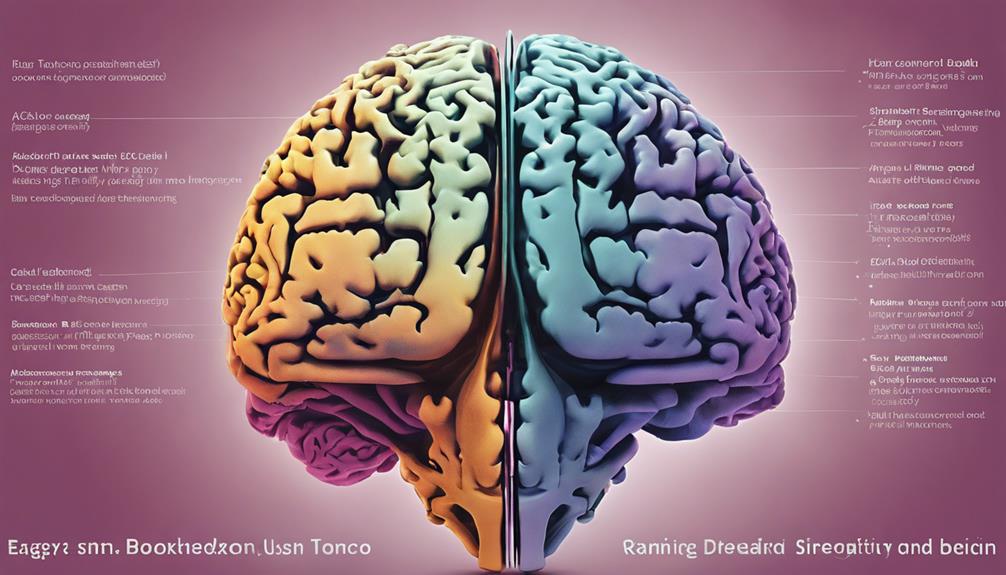Age-related cognitive decline and Mild Cognitive Impairment (MCI) exhibit differences in memory functions. As individuals age, their processing speed tends to slow down, making decision-making more challenging. In cases of MCI, memory loss is more pronounced, indicating potential early signs of dementia. People with MCI often struggle significantly with memory tasks, whereas other brain functions are less affected. Accurate diagnosis of MCI can be achieved through memory tests. Strategies such as cognitive training and physical exercise can be beneficial in managing cognitive decline. However, there is still much to learn about these cognitive changes, leading to a deeper understanding of how our brains evolve over time.
Key Takeaways
- Age-related decline involves minor memory and processing speed issues.
- MCI represents a transitional stage to early dementia with noticeable memory impairment.
- MCI individuals often exhibit more frequent and severe memory deficits.
- Diagnosis of MCI requires specific memory tests and clinical interviews.
- MCI shows less severe deficits in other cognitive functions compared to dementia.
Age-Related Cognitive Decline: Overview
Exploring age-related cognitive decline reveals the essential process affecting cognitive functions as we age. As individuals grow older, certain cognitive abilities such as processing speed and executive functions may start to decline. Tasks that require quick thinking or decision-making may become more challenging. Additionally, issues with cognitive inhibition, cognitive flexibility, and working memory can emerge in older adults. While language and episodic memory tend to hold up relatively well until around 80 years old, other cognitive functions may show signs of decline earlier.
It is important to understand these changes to differentiate between normal aging and conditions like Mild Cognitive Impairment (MCI). By recognizing the variances in cognitive decline associated with aging, we can better identify when cognitive changes may be indicative of a more serious issue. Through this understanding, we can offer appropriate support and interventions to help individuals navigate the complexities of cognitive aging with grace and dignity.
Characteristics of Age-Related Cognitive Decline

Age-related cognitive decline manifests through a gradual deterioration in processing speed, working memory, and cognitive flexibility, impacting daily cognitive functions. This decline can affect various aspects of cognitive abilities. Symptoms of cognitive decline may include difficulty concentrating, easily forgetting recent events, or struggling with problem-solving tasks that once came effortlessly. These challenges can interfere with day-to-day activities, making tasks such as organizing or planning more difficult over time. While the onset and severity of symptoms can vary, early recognition is crucial in managing the impact of age-related cognitive changes.
- Challenges in inhibitory control may lead to difficulties in goal-oriented actions and decision-making.
- Declines in perceptual-motor function can impact visual perception, motor coordination, and reasoning abilities.
- Memory functions may remain stable in middle adulthood before showing signs of decline in older age.
- Aging can affect attention and problem-solving abilities.
- Mild Cognitive Impairment (MCI) specifically targets memory functions, setting it apart from broader age-related cognitive changes observed in healthy aging.
Understanding these characteristics of age-related cognitive decline can help individuals recognize normal aging changes versus concerning cognitive impairments like MCI. By staying informed and proactive in maintaining cognitive health through activities like mental exercises and a healthy lifestyle, individuals can potentially mitigate the effects of age-related cognitive decline and improve overall cognitive well-being.
Mild Cognitive Impairment (MCI): Understanding
MCI represents an intermediate cognitive stage between normal aging and early dementia, characterized by memory impairment alongside milder deficits in other cognitive domains. Individuals with MCI may experience challenges with memory, such as forgetting recent events or having difficulty recalling information. Unlike normal aging, where occasional memory lapses are common, MCI involves noticeable memory loss that can impact daily activities. While MCI can be important, it's essential to note that not all individuals with MCI will progress to dementia.
Diagnosis of MCI involves various assessments, including memory tests and general cognition evaluations. It's vital to differentiate MCI from normal aging and dementia to provide appropriate care and support for patients. Functional impairment in MCI is typically less severe than in dementia, allowing individuals to maintain a certain level of independence. Neuroimaging studies have shown differences in brain structure between MCI and dementia, with MCI patients often exhibiting larger hippocampal volumes. Understanding MCI is essential for early detection and management to improve the quality of life for individuals experiencing cognitive changes.
Contrasting Age-Related Decline and MCI

In understanding cognitive changes, it's important to differentiate between the typical age-related decline in memory and the distinct characteristics of Mild Cognitive Impairment (MCI).
When comparing age-related cognitive decline and MCI:
- Age-related cognitive decline involves minor memory and processing speed issues, while MCI represents a transitional stage to early dementia.
- Normal aging may have occasional memory concerns, whereas MCI shows noticeable memory impairment with less severe deficits in other cognitive functions.
- Individuals with age-related cognitive decline may display mild memory loss occasionally, whereas MCI individuals often exhibit more frequent and severe memory deficits.
- Distinguishing between normal aging memory loss and MCI involves evaluating the severity and frequency of memory impairments, with MCI posing a higher risk for dementia progression.
- Diagnosis of MCI necessitates specific memory tests, general cognition evaluations, and clinical interviews to differentiate it from normal aging and Alzheimer's Disease, highlighting the significance of precise clinical judgment.
Management Strategies for Cognitive Decline
To effectively address cognitive decline, implementing a combination of nonpharmacological treatments, pharmacological interventions, and lifestyle modifications is essential. Nonpharmacological treatments such as autonomic training, exercise, and social activities play an important role in managing cognitive decline. These interventions can help improve cognitive function and overall well-being.
Pharmacological interventions like antioxidants and medications such as galantamine can aid in reducing cognitive deterioration in individuals with cognitive impairment. Lifestyle modifications, including adopting a Mediterranean diet, engaging in moderate exercise, and participating in mentally stimulating activities, are recommended for cognitive decline management.
Tailored treatment strategies based on the specific cognitive disorders present are crucial for effectively managing cognitive decline. Addressing comorbidities, controlling vascular risk factors, and incorporating mentally stimulating activities into daily routines are significant components of cognitive decline management.
Frequently Asked Questions
What Is the Main Difference Between MCI Mild Cognitive Decline and Dementia?
We can differentiate between MCI and dementia by noting that MCI involves noticeable memory difficulties beyond normal aging, while dementia signifies severe cognitive impairment impacting various cognitive functions, leading to significant functional decline.
What Is One Way Typical Aging Differs From MCI Aging Associated With Pathology?
In typical aging, memory lapses are occasional, but in MCI, memory issues are consistent and noticeable. This distinction highlights the impact of pathology on memory function, emphasizing the need for early assessment and intervention strategies.
What Is the Difference Between Age Related Cognitive Impairment and Dementia?
We comprehend the difference between age-related cognitive impairment and dementia. While normal aging may involve mild memory loss, dementia is characterized by severe memory issues that greatly impact daily life. Consulting a professional can help clarify these distinctions.
What Is the Difference Between MCI and Normal Aging?
When comparing MCI to normal aging, we note distinct cognitive decline in MCI beyond typical age-related changes. Memory issues in MCI are more severe, impacting daily life to a considerable extent. Assessment of specific impairments helps differentiate between the two.
Conclusion
In summary, understanding the differences between age-related cognitive decline and MCI is like unraveling various routes in a labyrinth.
While both may involve memory issues, MCI presents more significant challenges.
It's important to seek early intervention and management strategies to navigate these cognitive changes effectively.
By staying informed and proactive, we can better equip ourselves to address these challenges and maintain peak brain health as we age.









